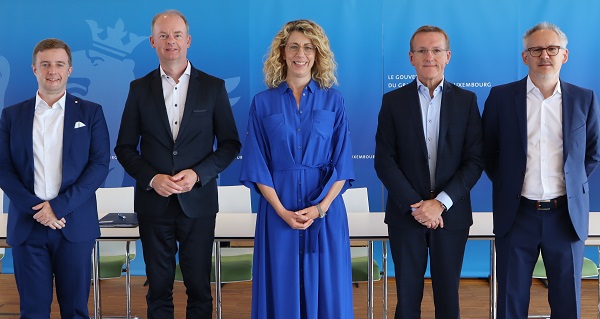 (L-R) Frank Lentz, House of Automobile; Andreas Cremer, Febiac; Joëlle Welfring, Luxembourg's Minister for the Environment, Climate and Sustainable Development; Dominique Roger, Mobiz; Philippe Mersch, Fedamo;
Credit: MECDD
(L-R) Frank Lentz, House of Automobile; Andreas Cremer, Febiac; Joëlle Welfring, Luxembourg's Minister for the Environment, Climate and Sustainable Development; Dominique Roger, Mobiz; Philippe Mersch, Fedamo;
Credit: MECDD
On Wednesday 19 July 2023, Luxembourg's Ministry of the Environment, Climate and Sustainable Development and the House of Automobile signed a new environmental agreement for better recovery of end-of-life vehicles.
The signatories recalled that a motor vehicle contains many materials such as steel, copper, aluminum and plastic. They added that the systematic recycling of these materials is key to achieving the EU's sustainability goals for climate and resilience. In the past, EU rules have improved the collection of end-of-life vehicles, reduced the use of hazardous substances in vehicles and increased the recycling rate of metal materials to almost 85%. However, some metals are still insufficiently sorted and recycled, which means untapped potential for both the environment and the economy, noted the signatories.
By signing this environmental agreement, the three federations represented in the House of Automobile (Febiac, Fedamo and Mobiz) and the Environment Ministry will determine in more detail the obligations of producers and the procedure for the management of waste from end-of-life vehicles.
The involvement of House of Automobile in the process of developing this agreement has established a framework that can evolve in the future towards an extended producer responsibility system to follow up on a shared approach between federations.
This agreement replaces the one signed in 2016, which has since expired.
This new agreement is expected to make it possible to continue to manage end-of-life vehicles in Luxembourg and to guarantee efficient management of the resources emanating from this waste stream. For example, when a vehicle becomes waste, all dangerous substances must be eliminated so as not to contaminate the environment. Then, the various materials are recycled and reused as part of a circular economy. In practice, more than 97% of end-of-life vehicles in Luxembourg are either reused as spare parts or their materials are recycled. As a result, Luxembourg largely achieved its European objectives in 2020, when approximately 2,400 vehicles entered a recycling sector.
The agreement will also allow the Grand Duchy to document, in the form of reporting to the European Commission, the efforts made by Luxembourg automotive players to guarantee waste management in accordance with the objectives set out in community texts.
Finally, this new agreement will make it possible to support the preparatory work allowing the establishment of an extended producer responsibility system aimed at the management of end-of-life vehicles.








